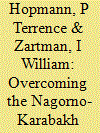| Srl | Item |
| 1 |
ID:
102502


|
|
|
|
|
| Publication |
2011.
|
| Summary/Abstract |
This special issue of International Negotiation includes a range of studies and essays on the analysis of negotiation of contemporary conflicts that reflects the influence of I. William Zartman and his leadership of the Conflict Management Program at the Johns Hopkins School of Advanced International Studies. He introduced some of the most significant and enduring concepts that have guided theory building and empirical analysis of negotiations for at least the past four decades. In this issue, eight of his colleagues and former students have contributed their research - applying many of Zartman's concepts and frameworks.
|
|
|
|
|
|
|
|
|
|
|
|
|
|
|
|
| 2 |
ID:
172307


|
|
|
|
|
| Summary/Abstract |
The global arms control regime that began with the Partial Nuclear Test Ban Treaty (1963) appears to be collapsing rapidly, with many agreements now abandoned or barely enforced. This article analyzes some of the challenges to new negotiations on arms control based on developments in negotiation theory over the past 60 years. It focuses on the management of multilateral rather than bilateral negotiations, the need to focus on absolute rather than relative gains, the use of problem-solving techniques rather than traditional bargaining, the management of domestic opposition to arms control, the need for national leaders to become active proponents of new negotiations, and the need to focus on norms of cooperative security rather than engaging in arms races. It concludes that a necessary, if not sufficient, condition to save and rebuild the arms control regime is the adoption of more constructive approaches to negotiation on these vital issues.
|
|
|
|
|
|
|
|
|
|
|
|
|
|
|
|
| 3 |
ID:
095122


|
|
|
|
|
| Publication |
2010.
|
| Summary/Abstract |
Six authors of the younger generation - three from Armenia and three from Azerbaijan - examine the conflict over Nagorno-Karabakh in a joint effort to overcome their heritage of stereotypes and hostility. While their proposals vary, there is some creative overlap, and all of them recognize the obstacles as four standard characteristics of intractable conflicts: no salient solution, no ripeness, profitability, and no Zone of Possible Agreement (ZOPA). From these obstacles stem some ideas for creative progress, if not immediate solutions.
|
|
|
|
|
|
|
|
|
|
|
|
|
|
|
|
| 4 |
ID:
032756


|
|
|
|
|
| Publication |
London, Macmillan Press Ltd, 1988.
|
| Description |
xii, 374p.
|
| Standard Number |
0333431359
|
|
|
|
|
|
|
|
|
|
|
|
Copies: C:1/I:0,R:0,Q:0
Circulation
| Accession# | Call# | Current Location | Status | Policy | Location |
| 030087 | 355.031/HOP 030087 | Main | On Shelf | General | |
|
|
|
|